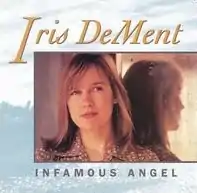Infamous Angel
Infamous Angel is the debut studio album of American country music singer-songwriter Iris DeMent. It was released by Philo Records in 1992. The liner notes were written by John Prine, to whom DeMent's music has been compared by Los Angeles Times critic Robert Hilburn.[1]
| Infamous Angel | ||||
|---|---|---|---|---|
 | ||||
| Studio album by | ||||
| Released | October 7, 1992 | |||
| Studio | Cowboy Arms Hotel and Recording Spa, Nashville, Tennessee | |||
| Genre | Country Folk | |||
| Length | 38:28 | |||
| Label | Rounder (Philo), Warner from 1993 | |||
| Producer | Jim Rooney | |||
| Iris DeMent chronology | ||||
| ||||
In 1995, her song "Our Town" was played in the closing moments of the last episode for the CBS TV series Northern Exposure. It has also been recorded by Kate Rusby and by Jody Stecher and Kate Brislin.
The Transatlantic Sessions version of "Let the Mystery Be" became the theme song for the second season and series finale of The Leftovers.
| Review scores | |
|---|---|
| Source | Rating |
| AllMusic | |
| Chicago Tribune | |
| Christgau's Consumer Guide | B+[4] |
| The Encyclopedia of Popular Music | |
| Entertainment Weekly | A[6] |
| The New Rolling Stone Album Guide | |
| Pitchfork | 9.0/10[8] |
| Spin Alternative Record Guide | 5/10[9] |
Track listing
All songs by Iris DeMent except as indicated.
- "Let the Mystery Be" – 2:46
- "These Hills" – 3:40
- "Hotter Than Mojave in My Heart" – 2:33
- "When Love Was Young" – 3:38
- "Our Town" – 4:58
- "Fifty Miles of Elbow Room" (Rev F.W. McGee) – 3:12
- "Infamous Angel" – 3:46
- "Sweet Forgiveness" – 2:44
- "After You've Gone" – 4:04
- "Mama's Opry" – 3:25
- "Higher Ground" (listed as "Traditional" in the liner notes but in fact by Johnson Oatman, Jr. (lyrics) and Charles H. Gabriel (music)[10]) – 3:34
Personnel
- Iris DeMent – lead and harmony vocals, guitar
- Additional musicians
- Jeff Black – harmony vocals (11)
- Flora Mae DeMent – lead vocals (11)
- Jerry Douglas – Dobro (7)
- Stuart Duncan – fiddle, mandolin
- Emmylou Harris – harmony vocals, guitar (10)
- Mark Howard – guitar
- Jeff Hushkins – bass
- Roy Huskey, Jr. – bass
- Hal Ketchum – harmony vocals (11)
- Al Perkins – Dobro (1–6, 8–11)
- Jim Rooney – producer, harmony vocals (6, 11)
- Pete Wasner – piano
- Technical
- Richard Adler – recording and mixing engineer
- Kelley McRae - cover photography
Charts
| Chart (1996) | Peak position |
|---|---|
| Australian Albums (ARIA Charts)[11] | 83 |
References
- Hilburn, Robert (November 2, 1992). "From the New to Neil". Los Angeles Times. ISSN 0458-3035. Retrieved March 27, 2018.
DeMent's warm, inviting manner as a writer recalls John Prine's feel for sentimental tales of people and places. Prine must think so too. He wrote the album's liner notes.
- Smith, Jim. "Infamous Angel". AllMusic. Retrieved January 25, 2018.
- Kot, Greg (June 1, 1992). "Iris DeMent Infamous Angel (Philo)". Chicago Tribune. Retrieved January 25, 2018.
- Christgau, Robert (October 1, 2000). "Iris DeMent". Christgau's Consumer Guide: Albums of the '90s. Macmillan Publishing. ISBN 9780312245603.
- Larkin, Colin (2011). The Encyclopedia of Popular Music. Omnibus Press. ISBN 9780857125958.
- Altman, Billy (September 4, 1992). "Infamous Angel". Entertainment Weekly. Retrieved July 10, 2018.
- Kot, Greg (2004). "Iris DeMent". In Brackett, Nathan; Hoard, Christian David (eds.). The New Rolling Stone Album Guide. Simon and Schuster. p. 228. ISBN 9780743201698.
- Greene, Jayson (January 24, 2021). "Iris DeMent: Infamous Angel". Pitchfork. Retrieved January 24, 2021.
- Weisbard, Eric; Marks, Craig (1995). Spin Alternative Record Guide. Vintage Books. ISBN 9780679755746.
- Cyber Hymnal, Higher Ground, accessed August 18, 2019
- Ryan, Gavin (2011). Australia's Music Charts 1988–2010 (PDF ed.). Mt Martha, Victoria, Australia: Moonlight Publishing. p. 78.
This article is issued from Wikipedia. The text is licensed under Creative Commons - Attribution - Sharealike. Additional terms may apply for the media files.